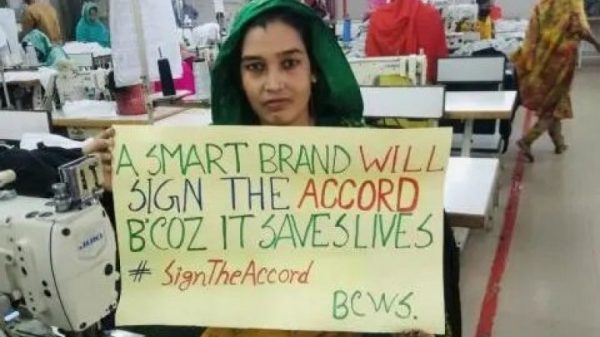Many US-based clothing brands yet to join accord in Bangladesh: HRW

Shawdesh desk:
Human Rights Watch, in a report on Tuesday said that many clothing brands, mostly from the United States, had not joined the accord on health and safety in Bangladesh, a decade after the collapse of the Rana Plaza building in Bangladesh that killed more than 1,100 garment workers and injured more than 2,000.
‘The accord on health and safety is the strongest indicator for consumers that a brand is committed to protecting workers from fire and building disasters in Bangladesh,’ said Aruna Kashyap, associate corporate accountability director of Human Rights Watch.
‘Nearly 200 global brands are part of the accord and others need to follow.’
Joining the Accord is a way for brands to signal that they back the strongest possible safeguards available to date against fire and building safety risks for factory workers.
The International Accord on Health and Safety in the Textile and Garment Industry, which covers Bangladesh, was first signed in May 2013. It is a legally binding agreement between clothing brands and global unions that created an inspection and remediation programme to mitigate fire, building, electrical, and boiler safety risks for factory workers.
The programme also includes a complaints mechanism for workers to file grievances about health and safety concerns and violations of their right to organise.
As of April 11, 195 brands are part of the accord in Bangladesh. Many other brands, mostly from the US, are yet to join.
The accord is unique because it is a legally enforceable agreement that brands have signed with workers’ unions to implement worker safety measures, Human Rights Watch said. The clothing companies are required to follow protocols developed under the accord.
Under the accord, clothing companies cannot prematurely cut business ties with factories after inspections detect fire, electrical, or building safety gaps. Instead, the brands are obligated to support remedial action and give factories sufficient opportunities to correct safety hazards. Only after the accord’s secretariat determines that corrective actions have been repeatedly delayed with no progress on the part of a factory are brands obliged to responsibly end business ties with the factory.
Under the accord, all inspection reports and remediation efforts are published for everyone to see. Workers can pursue arbitration if brands breach their contractual agreement with workers’ unions.
‘Firms that don’t already take steps to publicise the limitations of their health and safety risk mitigation services should be up-front about them and provide an accurate comparison to the accord’s features,’ Kashyap said.























Leave a Reply